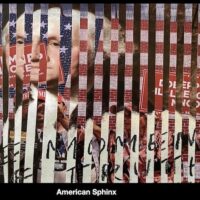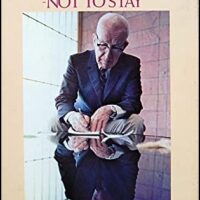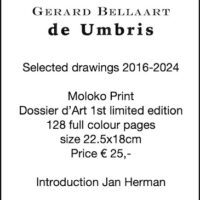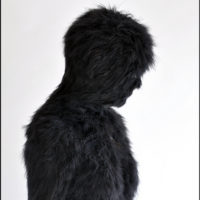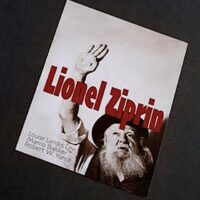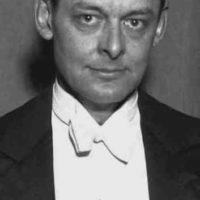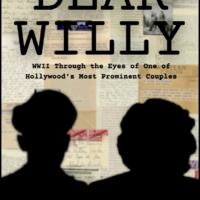aaaaarrrrrffffff !!!!!!
Once Again, What Would Daumier Make of Trump?
Honoré Daumier went to prison for six months for his 1831 lithograph after its publication in a satirical illustrated periodical that appeared weekly in Paris, “La Caricature morale, politique et littéraire.”.
American Sphinx
No words needed.
The Late Brion Gysin (1916-1986) Is Having a Moment
Over the years he had many, in fact, although few of them lived up to his expectations. But never mind. An updated model of his and Ian Sommerville’s Dreamachine was recently featured in a symposium on art, AI, and the humanities here in New York; and another will be installed in London at the Tate Modern, in the exhibition “Electric Dreams: Art and Technology Before the Internet,”which will run from the end of this month (Nov. 28) to June 1, 2025. Meanwhile, Roger Knoebber has brought Gysin back to life in a shaggy, unconventional book-length profile, “Hysteresis.”
Buckminster Fuller’s Versified Prose
By my philosophy
The finite, but imponderable
Metaphysical Universe
Embraces the definite,
Ponderable, physical Universe.
‘Finite’ is not unitarily conceptual.
‘Definite’ is unitarily conceptual.
I have mathematical proof …
What Next, Trump Shoelaces?
I see that the Prez-elect is hawking guitars, his latest grift. (No indication of where they’re made.) So how about shoelaces? Very strong. Easily knotted. Made in China. Only 2 cents each, pre-tariff.
This item has been updated.
Does the Dreamachine Elude AI? Yes It Does.
Scholars and specialists addressed ethical and political considerations surrounding AI in collaborations with human creators. Topics ranged from AI aesthetics to the early history of machine learning, from multimedia art to computational research experiments with artificial intelligence, including AI biases and applications.
Fools, Fanatics, and Flunkeys
“The dodo bird cheered, swaggered, and strutted away.”
‘The Hanging’ and ‘Wheel of Fortune’
These drawings, which appear in “di Umbris,” a dossier of Gerard Bellaart drawings just published by Moloko, were not intended as commentary on current events. But I can’t shake the sensation that they are.
Will the ‘Four Freedoms’ Go the Way of the Dodo Bird?
The Bible gave us the Ten Commandments. The Constitution gave us the first 10 amendments, our Bill of Rights. Franklin Delano Roosevelt gave us the ‘Four Freedoms,’ chiseled in stone at the tip of Roosevelt Island as a monumental reminder of his legacy. Will the monument be all that’s left of his legacy?
David Erdos: ‘The United Hates of America’
You can be sure his poem will not be read at the Orange Turd’s coronation.
A Second Look
Touched by a Documentary Ode to Nelson Algren
Some years ago I criticized Michael Caplan’s documentary ode to Nelson Algren as the cinematic equivalent of a pop tart. Now that I’ve had another look I see that I was very wrong.
Human Figuration as an Expression of Ideas
These drawings move across centuries, from the Middle Ages to our blighted times in an unflinching rawness that gives no comfort. Nothing is omitted. You will find the sexual inscribed like watermarks of passion and anguish. The demonic appears in equal measure with the angelic. Most of all, not unlike cave drawings of prehistoric times, they are an existential record of a particular creature, Bellaart by name.
‘What Is There to Frighten Us?’
the world’s condition
was never intended
to forego the pleasure
of a passing hope
Lionel Ziprin: ‘One of the Secret Heroes of Our Time’
“I am not an artist. I am not an
outsider. I am a citizen of the
republic and I have remained
anonymous all the time by choice.”
I Guess It Had to Happen
Julian Peters has done Poe, Rimbaud, Frost, Keats, Dylan Thomas, Wordsworth, Oscar Wilde, Villon, Yeats, Sassoon, and plenty of others — and they’re all damn well done — so why not T.S. Eliot?
‘Dear Willy’ Tells a War Tale of Love and Hope
The letters that Hollywood director William Wyler and his wife Talli wrote to each other during World War II are the basis of a new documentary directed by Taylor Alexander.

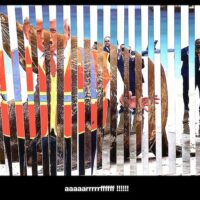
![Lithograph by Honoré Daumier [1831]](https://www.artsjournal.com/herman/wp/wp-content/uploads/2018/04/daumier_honore_1-200x200.jpg)
